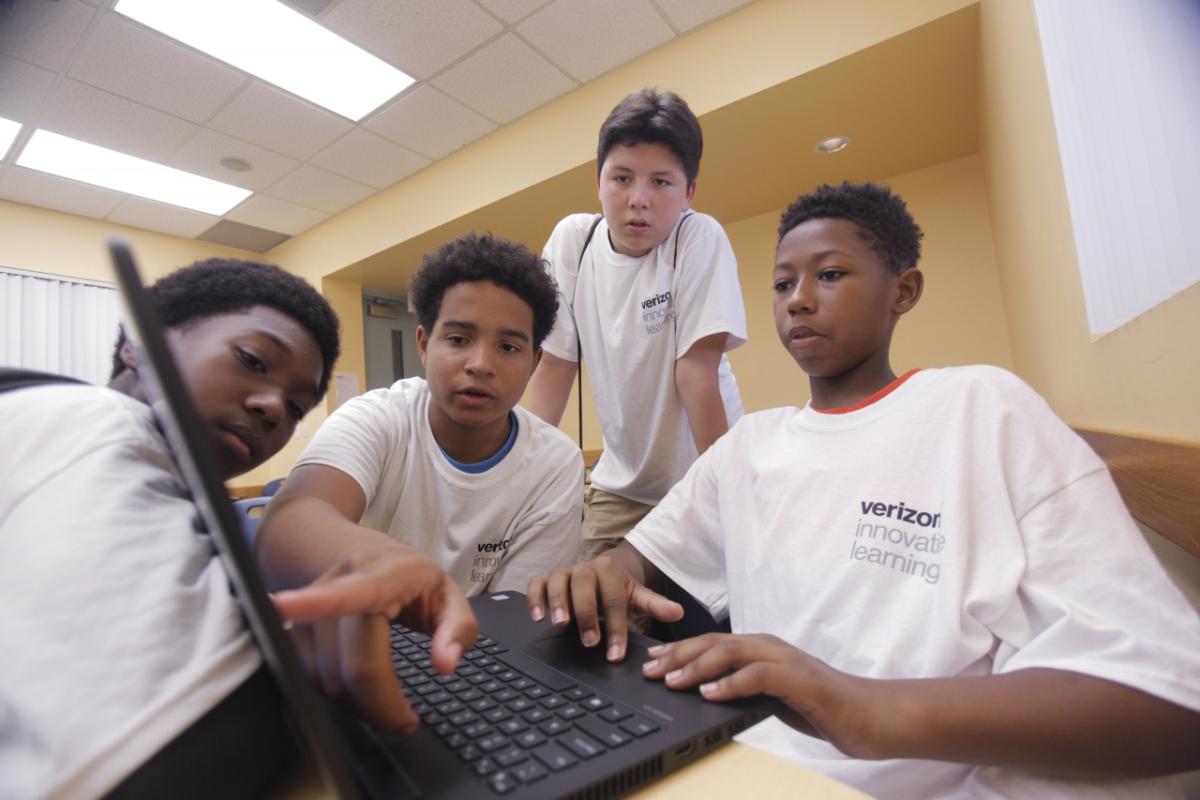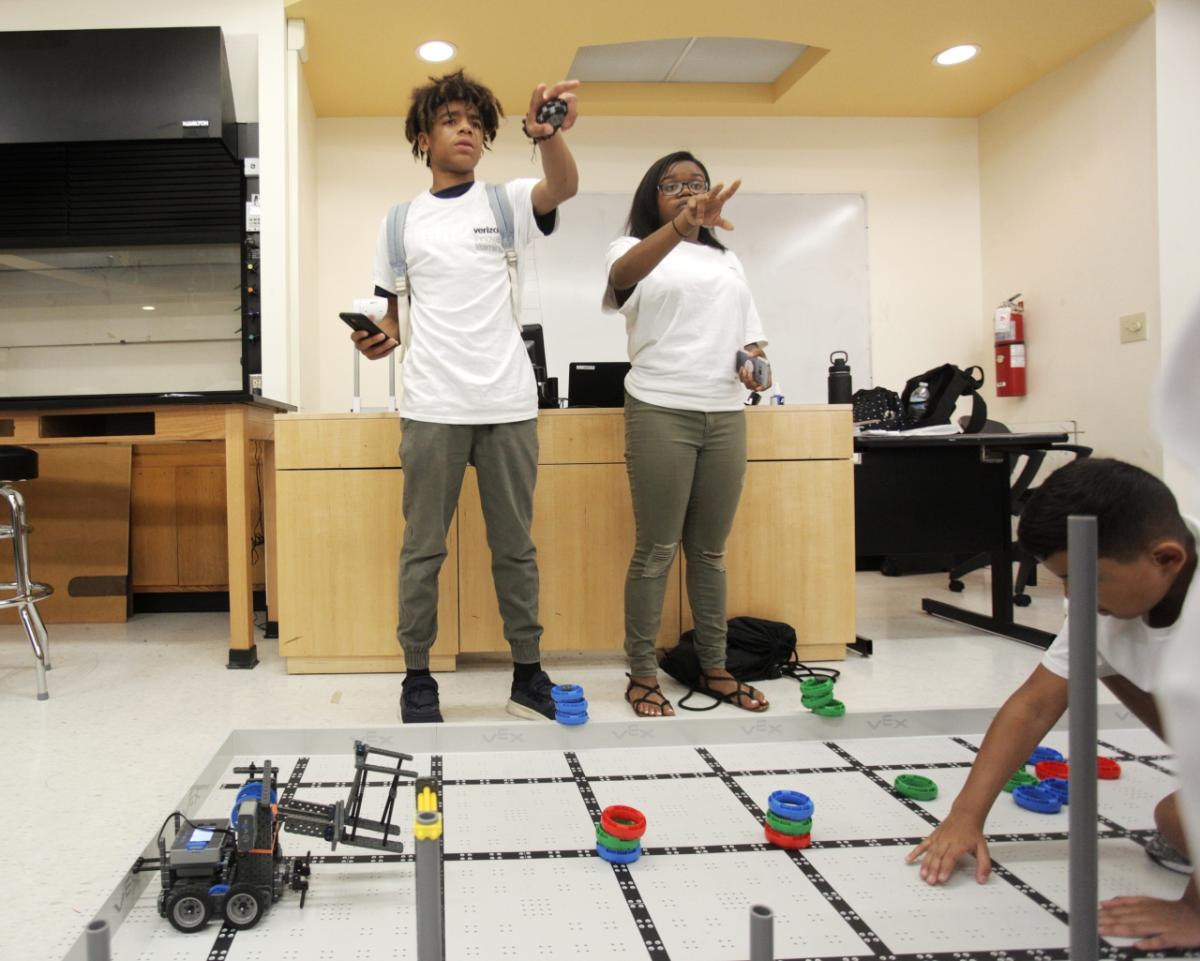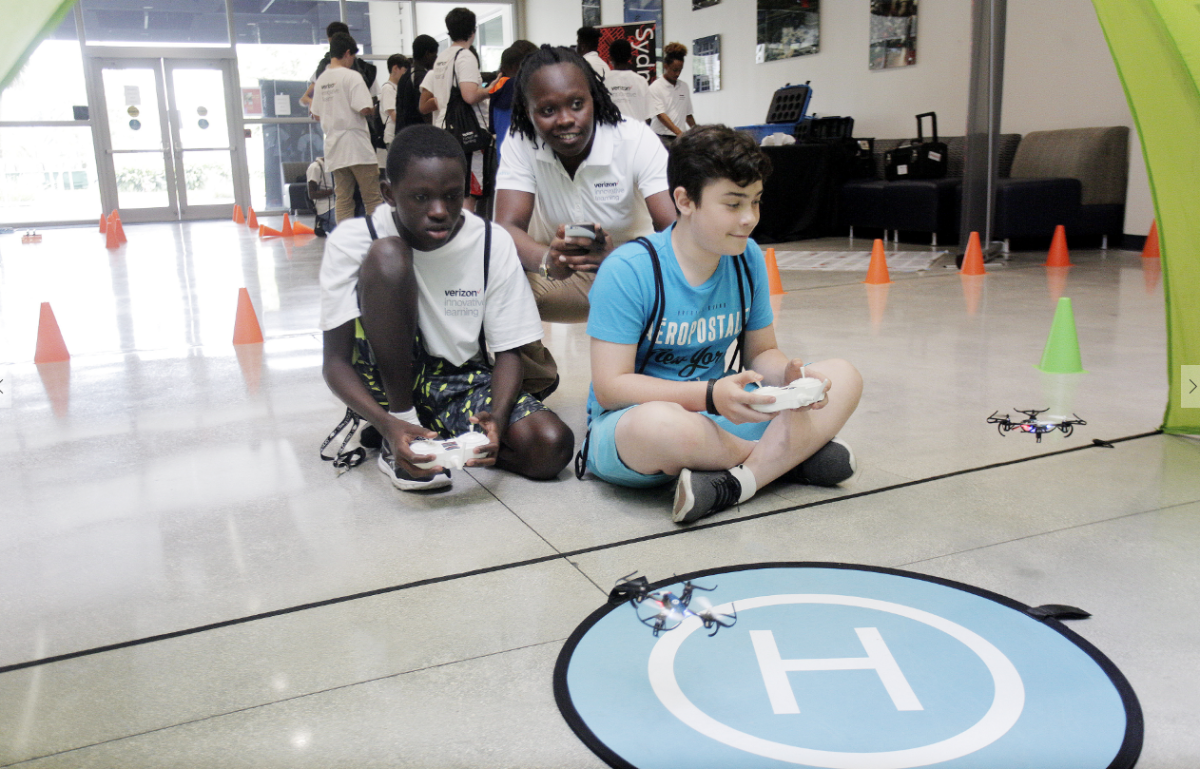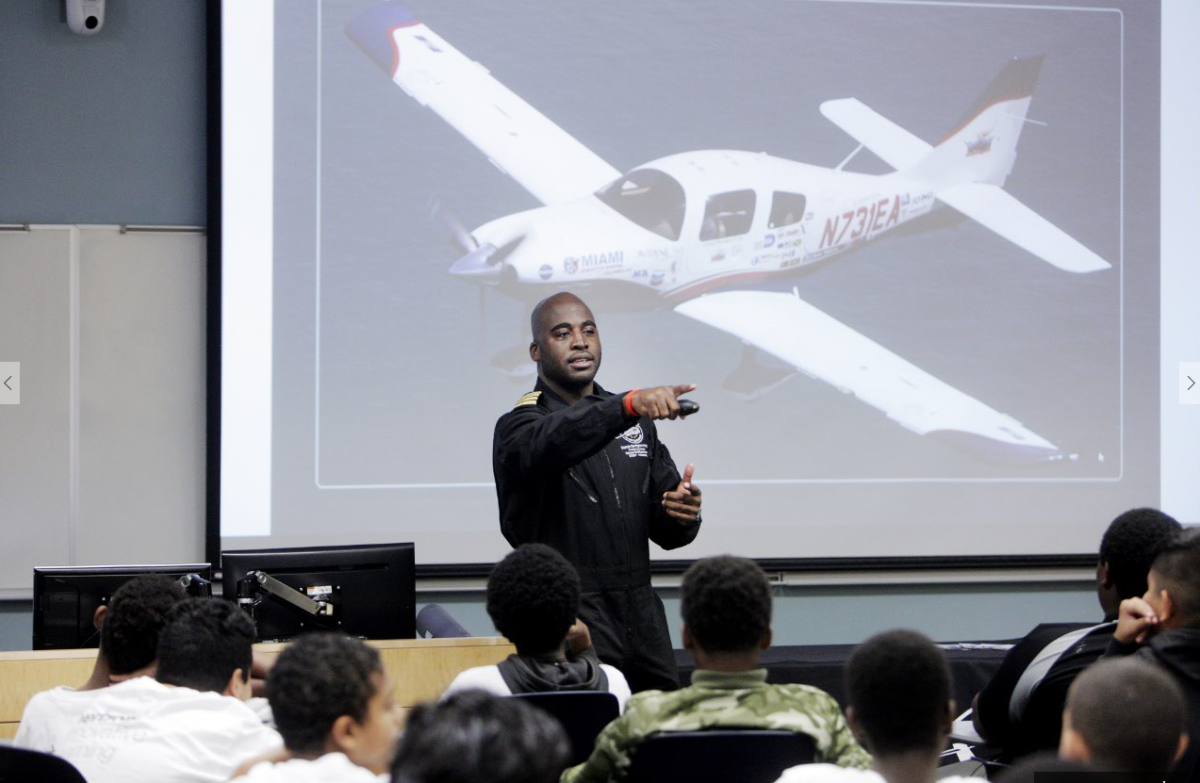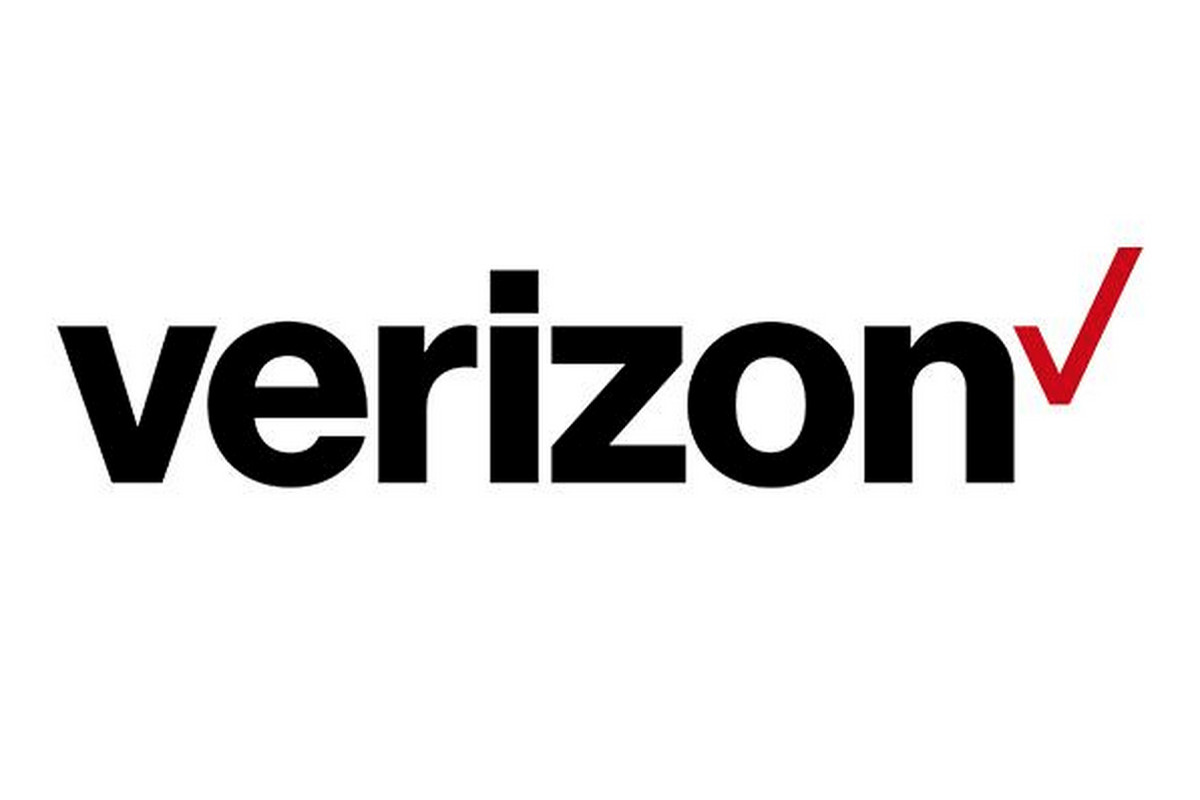"Because We Can!"
This STEM program is empowering boys to put their world-changing ideas into action
“He became a leader.” Jean Nicoleau talked about her student, Tyghe, and his transformation after his first summer with Verizon Innovative Learning as if she were describing two different people. One version of Tyghe had an energy and attitude that were disruptive at times. Prior to Verizon Innovative Learning, Nicoleau had known Tyghe for several years and watched him struggle in school. But during the past school year, his grades, confidence and sense of responsibility all improved. New Tyghe was someone with a purpose; someone teachers wanted in their classrooms.
Tyghe returned to Verizon Innovative Learning as one of more than 60 boys in a three-week immersive program at Florida International University (FIU) in Miami. It’s one of 24 such programs occurring across the U.S. this summer geared to African American and Hispanic middle school boys. Students in the program are given access to world-class technology — from 3D printers to autonomous robots to drones — and asked to solve some of the globe’s biggest problems. It’s all part of the Verizon Innovative Learning mission to provide free technology, free internet access and hands-on learning experiences to under-resourced students to help them get the skills they need to succeed in a digital world.
Now in its second summer at FIU, the program not only increases students’ abilities with math and science, according to a 2017 study of program participants, but also motivates the young men to a new confidence that carries into the school year, putting them on a path to build brighter futures. They are in a better position to change the outcomes of their own generation, and those that follow. When asked why they believe they can change the world, participants like Jonathan, British and Gideon all had the same response: “Because we can.”
Jonathan, 7th Grade
“We have the power to help others,” said Jonathan as he sat a few feet from the 3D printer that will turn his design for a spoon to assist tremors patients into a prototype for his team’s STEM project. Like the rest of the boys in the program, Montero was given transportation from a surrounding Miami neighborhood and free breakfast as the day began. At home, Jonathan, whose roots are Puerto Rican and Dominican— used to watch his abuelo (“grandpa”) struggle to eat as tremors shook his hands. The program let Jonathan get his own hands on technology not readily available at school, and now he’s president of his after-school robotics club. Being in close contact with the tools for three weeks changed Jonathan’s outlook on how he can create positive change for patients like his grandpa. “The [program] helps us turn our ideas into a real life thing.”
British, 7th Grade
One of the boys who engaged well beyond the borders of the program is 13-year-old British. Troubleshooting the 3D printer or autonomous robots was the game-changer that helped British believe he can turn designs in his head into tangible solutions. He preferred the program’s collaborative, hands-on approach to problem solving to the instruction he gets at school, but he also was focused on the challenge that awaited him once it was done. “I’m going to Puerto Rico to help my family with hurricane relief. I can build simple structures,” he said. “I need to help them.”
Gideon, 8th Grade
Gideon also spoke about the maladies of the modern world, but his observations and the program’s intensive curriculum birthed a question inside of his own consciousness. “There are so many negative things, so I wonder, why are we trying to help ourselves?” he asked. “We should be working to help others.”
Gideon’s STEM project turned food waste into electricity, and his eyes lit up when a similar project came up in the Flying Classroom lecture. Captain Barrington Irving — who grew up in Miami under the very planes flying over campus — shared observations from his own world travels. At the age of 23, Irving went on a 97-day, 30,000-mile journey which made him the youngest person and the first African-American pilot to fly solo around the world in a single engine airplane. Like many of these boys, Irving had aspirations of being a professional athlete, but one encounter with a pilot changed his idea of what he could become if he pursued a career in STEM. Immersing middle school boys in an environment alongside STEM curricula and like-minded explorers creates a more open mindset, and it’s the greatest benefit of Verizon Innovative Learning according to Irving.
Monique Ross, Assistant Professor, Computer Science, Florida International University
Monique Ross, a researcher and assistant professor of computer science at FIU, said that it’s paramount to maintain unique pathways to STEM after the summer program, so her student-mentors see the boys several times throughout the school year as part of the Verizon Innovative Learning program. Ross’ study of the student-mentors after the program’s first summer revealed an increased desire to participate in altruistic opportunities, with some saying that the life-changing experience inspired them to take more command of their own lives and also better influence the lives of future generations.
The boys are shown that they can achieve lofty goals when they set a plan, execute, refine and repeat. Equipped with minimal resources, the boys solve simple dilemmas — like helping tired parents care for younger siblings — all the time when they’re not at the program or school. Being at FIU showed the boys that their inherent problem-solving skills also could land them jobs and give them opportunities to change the world. It also challenged them to change their approach to school.

